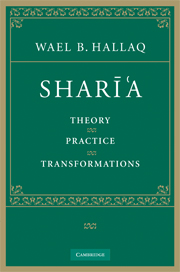Book contents
- Frontmatter
- Contents
- Preface and acknowledgments
- Introduction
- Part I The pre-modern tradition
- Part II The law: an outline
- 6 The legal pillars of religion
- 7 Contracts and other obligations
- 8 Family law and succession
- 9 Property and ownership
- 10 Offenses
- 11 Jihād
- 12 Courts of justice, suits and evidence
- Part III The sweep of modernity
- Appendix A Contents of substantive legal works
- Appendix B Chronology
- Bibliography
- Index
9 - Property and ownership
Published online by Cambridge University Press: 05 June 2012
- Frontmatter
- Contents
- Preface and acknowledgments
- Introduction
- Part I The pre-modern tradition
- Part II The law: an outline
- 6 The legal pillars of religion
- 7 Contracts and other obligations
- 8 Family law and succession
- 9 Property and ownership
- 10 Offenses
- 11 Jihād
- 12 Courts of justice, suits and evidence
- Part III The sweep of modernity
- Appendix A Contents of substantive legal works
- Appendix B Chronology
- Bibliography
- Index
Summary
Introduction
The Islamic juristic categories of ownership and property are grounded in the theological conception that God is the sole and ultimate Owner (Mālik) of the universe. Mālik, a name and an attribute of God, is the active participle denoting “one who owns,” while milk, the verbal noun, represents a state in which ownership obtains. God is thus the true Owner of everything, including human beings and all they possess. Strictly speaking, therefore, human beings own nothing. And so it is only by divine generosity that it becomes possible for human beings to claim, and only in a metaphorical (majāzī), not a real (ḥaqīqī), sense, rights of ownership over parts of the world. This generosity manifested itself as an act of delegation and subsidiary empowerment. Quran 57:7 states: “Believe in Allah and His Messenger, and spend (anfiqū) of that with regard to which he made you [his] deputies” (mustakhlafīna fīhi). Human ownership, put in legal terms, is empowerment by agency (wakāla), and it is constrained by the terms of good conduct expected of humans in dispensing of God's wealth. Good conduct in dispensation is linguistically funneled through the imperative form “spend” which, throughout centuries of legal discourse, consistently refers to spending in the way of care and charity, including on one's family, relatives, and the poor, all of which translate into a duty to care for one's community.
- Type
- Chapter
- Information
- Sharī'aTheory, Practice, Transformations, pp. 296 - 307Publisher: Cambridge University PressPrint publication year: 2009



